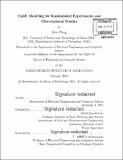Uplift modeling for randomized experiments and observational studies
Author(s)
Fang, Xiao, Ph. D. Massachusetts Institute of Technology
DownloadFull printable version (8.959Mb)
Other Contributors
Massachusetts Institute of Technology. Department of Electrical Engineering and Computer Science.
Advisor
David Simchi-Levi.
Terms of use
Metadata
Show full item recordAbstract
Uplift modeling refers to the problem where we need to identify from a set of treatments the candidate that leads to the most desirable outcome based on subject characteristics. Most work in the last century focus on the average effect of a treatment across a population of interest, but ignores subject heterogeneity which is very common in real world. Recently there has been explosion of empirical settings which makes it possible to infer individualized treatment responses. We first consider the problem with data from randomized experiments. We put forward an unbiased estimate of the expected response, which makes it possible to evaluate an uplift model with multiple treatments. This is the first evaluation metric of uplift models aligning with the problem objective in the literature. Based on this evaluation metric, we design an ensemble tree-based algorithm (CTS) for uplift modeling. The splitting criterion and termination conditions are derived with the consideration of the special structure of uplift modeling problem. Experimental results on synthetic data and industry data show the advantage of our specialized uplift modeling algorithm over separate model approach and other existing uplift modeling algorithms. We next prove the asymptotic properties of a simplified CTS algorithm. The exhaustive search for locally optimal splitting points makes it difficult to theoretically analyze tree-based algorithms. Thus we adopt dyadic splits to CTS algorithm and obtain the bound of regret-expectation of performance difference between oracle and our algorithm. The convergence rate of the regret depends on the feature dimension, which emphasizes the importance of feature selection. While model performance usually improves with the number of features, it requires exponentially more data to approximate the optimal treatment rule. Choosing the appropriate complexity of the model and selecting the most powerful features are critical to achieving desirable performance. Finally we study the uplift modeling problem in the context of observational studies. In observational studies. treatment selection is influenced by subject characteristics. As a result. baseline characteristics often differ systematically between different treatments. Thus confounding factors need to be untangled before valid predictions are made. We combine a modification of the standard feed-forward architecture with our CTS algorithm to optimize predictive accuracy and minimize feature distribution distance between treatment. Experimental results on synthetic data show that the combination of neural network feature representation and ensemble tree-based model is promising to handle real-world problems.
Description
Thesis: Ph. D., Massachusetts Institute of Technology, Department of Electrical Engineering and Computer Science, 2018. Cataloged from PDF version of thesis. Includes bibliographical references (pages 101-107).
Date issued
2018Department
Massachusetts Institute of Technology. Department of Electrical Engineering and Computer SciencePublisher
Massachusetts Institute of Technology
Keywords
Electrical Engineering and Computer Science.